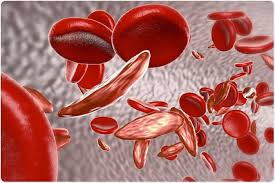SICKLE cell disease remains a public health concern. Recognised by the United Nations since 2008, World Sickle Cell Day (SCD) marks the global resolve to address one of the world’s leading genetic diseases. This year’s theme: “Global Action, Local Impact: Empowering Communities for Effective Self-Advocacy”, aptly mirrors the urgent need to enhance the quality of care and to eradicate SCD.
Sickle cell disease affects hemoglobin in the red blood cells. A genetic mutation causes abnormal hemoglobin to cluster together, causing the red blood cells to turn sickle-shaped. These sickle-shaped cells block blood flow, which then leads to anemia, pain, infections, and severe complications.
Across the world, about 100 million people are affected by the disease, with a huge number coming from sub-Saharan Africa. According to the World Health Organisation (WHO), over 300,000 babies are born annually with the condition, with Nigeria accounting for more than 150,000 of those births, translating to about 50 per cent of global SCD births. This has made the disease one of the significant causes of under-five mortality in the country, accounting for approximately eight per cent of total infant deaths.
While countries like the Democratic Republic of Congo, Cameroon, and Uganda also battle with high rates, Nigeria leads both in the number of births and the number of people living with the disease. Data reveals that over six million Nigerians live with sickle cell disorder, while about 25 per cent of the population, translating to about 50 million people, carry the sickle cell gene.
SCD affects not only the individual but also families and communities and stretches the healthcare system. While it is a menace, it is also important to reflect on the progress made and the steps needed to eradicate the disease.
One of the most notable advocates for sickle cell disease in Nigeria has been the immediate-past First Lady of Delta State, Dame Edith Okowa. Through her pet-project, 05 Initiative, she drove the establishment of 25 sickle cell clinics and a referral centre at the Asaba Specialist Hospital (ASH). These clinics have provided much-needed succour and support to individuals with the disease.
Despite these efforts, a lot needs to be done. Combatting the disease requires a varied approach that includes medical care, increased public awareness, and research into new treatments and potential affordable cures.
Access to quality medical care is key. Many SCD patients in Nigeria lack access to quality healthcare. This results in delayed or wrong diagnosis, poor disease management, and preventable complications. Newborn screening, which is routine in developed countries, should also be institutionalised across the country. Encouragingly, Delta State has begun offering free genotype testing for newborns within the first 28 days of life and for children under- five years.
The federal and state governments should build more specialised clinics, like those initiated by Dame Edith Okowa, to ensure that all patients have access to comprehensive care.
There is also a need for mass awareness campaigns, especially in rural areas, about the disease. By so doing, individuals will make informed decisions. Schools, community centres, and religious institutions can play an active role in disseminating information about the disease.
Research is another crucial facet in the fight against SCD. While advanced therapies like gene editing, amniocentesis, and bone marrow transplantation exist, they remain out of reach to many Nigerian families. However, with better funding and continuous research, cheaper and more effective drugs may be produced, or already existing medications can be subsidised and made more available in public health centres.
Governments, private sector partners, and international organisations should partner to fund and support advanced.


